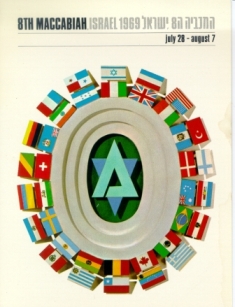
Albert "Albie" Axelrod was an American foil fencer.

The 17th Maccabiah Games, held in Israel, were an incarnation of the 'Jewish Olympics.' They attracted the largest attendance of any Maccabiah Games, including more than 900 representatives from the United States, almost 500 from Australia, and more than 2,000 from Israel, bringing the total participants to more than 7,700 from 55 countries.
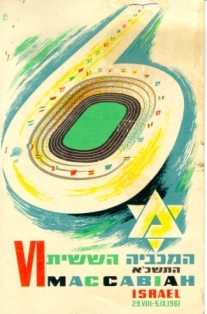
The 6th Maccabiah Games were held in Tel Aviv, Israel in 1961, with 1,100 athletes from 27 countries competing in 18 sports. The Games were officially opened in an Opening Ceremony on August 29, 1961, in Ramat Gan Stadium by Israeli President Yitzhak Ben-Zvi before a crowd of 30,000. The closing ceremony took place on September 5, 1961, at the stadium before a crowd of 40,000, with Israeli Prime Minister David Ben Gurion telling the crowd that he hoped that in the future athletes from North Africa, Poland, Hungary, Czechoslovakia, and the Soviet Union would also compete. The United States won 58 gold medals, Israel won 28 gold medals, and South Africa was third with 11 gold medals. American sportscaster Mel Allen narrated a film about the 1961 Games.

At the 10th Maccabiah Games in Israel, more than 2,800 athletes from 34 countries participated in 26 different sports, including chess and bridge and for the first time badminton.
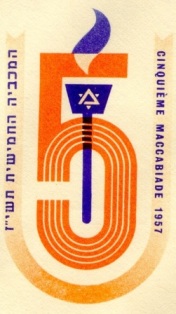
Twenty-one countries sent 980 athletes to compete in the 1957 5th Maccabiah Games, an international Jewish athletics competition similar to the Olympics. The opening ceremony on September 15, 1957, was held in Ramat Gan Stadium, with athletes parading before Israeli President Yitzhak Ben Zvi.
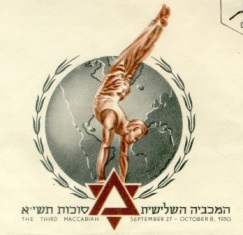
The 3rd Maccabiah took place during Sukkot from September 27 to October 8, 1950, with 17 countries competing. It was the third edition of the Maccabiah Games and the first held since the independence of the State of Israel; 15 years after the previous Maccabiah. Israel won the 1950 Maccabiah Games, Great Britain was second, South Africa third, the United States fourth, Canada fifth, and Austria sixth.

Eight hundred ninety athletes representing 23 countries competed in the 1953 4th Maccabiah Games, held September 20 to 29, in 18 branches of sports.

The 11th Maccabiah Games brought 3,450 athletes to Israel from 35 nations. The Opening Ceremony was held on July 7, 1981, before a crowd of 53,000 and Israeli Prime Minister Menachem Begin in Ramat Gan Stadium, with 3,500 Jewish athletes parading past him. Representative Jack Kemp and a supporter of Israel, marched with the United States team. Israel won the most medals (199), with 65 gold. The United States won 188 medals, 85 gold. South Africa, Britain, and Canada had the next-most number of total medals.
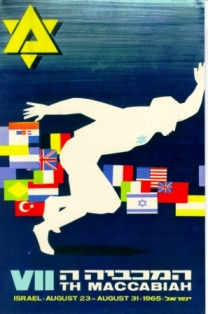
The 7th Maccabiah Games in 1965 saw 1,500 athletes from 29 different countries compete in 21 sports. It was the first Maccabiah Games for Iran, Jamaica, Peru, and Venezuela. The United States delegation won the most gold medals, followed by Israel, the United Kingdom, South Africa, Mexico and the Netherlands, Southern Rhodesia, Australia, Argentina and Italy, and Brazil, Canada, Denmark, and Sweden with one each.
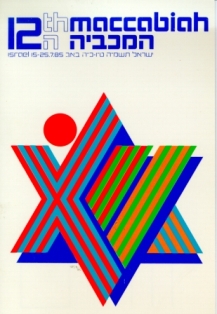
The 12th Maccabiah Games brought over 4,000 athletes to Israel from 38 nations to compete in 28 sports.
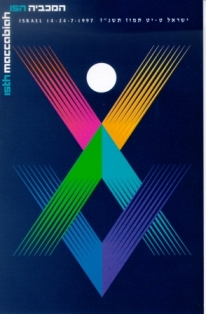
The 15th Maccabiah Games are remembered for being marred by a bridge collapse that killed several participants.

The 9th Maccabiah Games, which were held from July 9 to 19, 1973, were opened in Ramat Gan Stadium, Israel. Spain and Costa Rica made their debuts in the Games. A total of 1,800 athletes competed on behalf of 27 countries in 20 branches of sport, in 30 venues across Israel. The Games took place ten months after the 1972 Summer Olympics in Munich, where 11 Israeli athletes and coaches were slain during the Munich Massacre. The United States won 76 gold medals, and Israel was next with 60 gold medals.
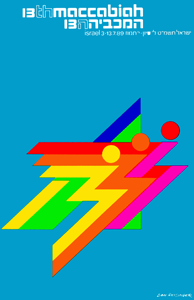
The 13th Maccabiah Games brought 4,500 athletes to Israel from 45 nations.

The 14th Maccabiah Games brought 5,100 athletes to Israel from 48 nations.
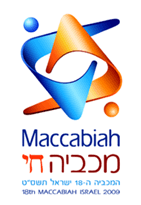
The 18th Maccabiah Games, were held in July 2009. According to the organizing committee these were the largest games held yet. These Games were the world's fifth-largest sporting event, behind the Olympic Games, Commonwealth Games, World Police and Fire Games, and Universiade. On the 13 July, more than 6,000 Jewish athletes from all over the world joined Team Israel's 3,000 participants at the Ramat Gan Stadium in Tel Aviv District, Israel, for the opening ceremony. American swimmer Jason Lezak was given the honor of lighting the Maccabiah torch at the Opening Ceremony.

The 19th Maccabiah were held during July 18 to 30, 2013.

The 2017 Maccabiah Games, also referred to as the 20th Maccabiah Games, were the 20th edition of the Maccabiah Games. They took place from 4 to 17 July 2017, in Israel. The Maccabiah Games are open to Jewish athletes from around the world, and to all Israeli citizens regardless of their religion. A total of 10,000 athletes competed, a Maccabiah Games record, making the 2017 Maccabiah Games the third-largest sporting competition in the world. The athletes were from 85 countries, also a record. Countries represented for the first time included the Bahamas, Barbados, Cambodia, the Cayman Islands, Haiti, Malta, Morocco, the Philippines, Singapore, South Korea, and Trinidad. The athletes competed in 45 sports.
Vicki Berner was a Canadian professional tennis player. During her career, Berner won the doubles event at the Canadian Open five times. Between 1964 and 1973, Berner competed in Grand Slam events. Her highest finishes were the quarterfinals of the 1967 Wimbledon Championships in women's doubles and the semifinals at the 1964 U.S. National Championships in mixed doubles. At the Fed Cup in the 1960s, Berner reached the quarterfinals at the 1964 Federation Cup in singles and the 1967 Federation Cup in doubles. In 1995, Berner was named into the Tennis Canada Hall of Fame.
Marilyn Jane Aschner is an American former professional tennis player. She was an Orange Bowl doubles champion in 1966, and she won a gold medal at the 1969 Maccabiah Games in Israel in doubles with partner Julie Heldman. She made the third round in women's doubles of the 1966 U.S. National Championships and 1968 Wimbledon Championships.
The 2022 Maccabiah Games took place in Israel from July 14–25, 2022, and are also referred to as the 21st Maccabiah Games. The Maccabiah Games are open to Jewish athletes from around the world, and to all Israeli citizens regardless of their religion. Israeli former Olympic judo medalist Arik Zeevi served as Maccabiah Chairman. Approximately 10,000 athletes from 80 countries competed in 42 sports categories.
